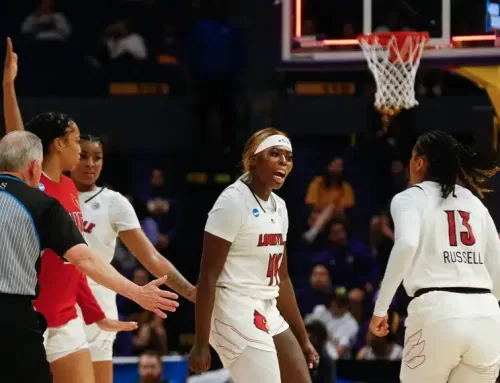By Shelby Brown–
U of L alumna Barbara Perry examined presidential leadership skills in the McConnell Center’s President’s Day lecture Feb. 20.
Calling George Washington, Abraham Lincoln and Franklin D. Roosevelt great presidents, Perry explained why some presidents were more “consequential” than others.
“You have to have preserved the country during an existential crisis or challenge,” Perry said.
Washington, Perry said, protected the Union as it was founded in a time of uncertainty. Lincoln protected the Union during the Civil War and Roosevelt kept the country united during the Great Depression and World War II.
Perry said Thomas Jefferson, Andrew Jackson, Lincoln, Roosevelt and Ronald Reagan were “reconstructive presidents,” and took the audience through hypothetical election scenarios opposing history.
Perry defined leadership from the U.S. Army Handbook, describing leadership as “influencing people by providing purpose, direction and motivation.” Perry said the vision must be clear.
“Great presidents are also great leaders,” Perry said. “I think this definition of leadership can be used by anyone in any organization.”
Perry spoke highly of Washington’s humility, saying he knew his weaknesses.
“He could’ve let himself become a king, but he stepped aside,” Perry said. “The sign of a good leader is one that is self-confident but not arrogant.”
All three presidents were measured on several scales including Doris Kearns Goodwin’s “elements of presidential greatness:”
- Courage and self-confidence
- Learning from mistakes
- Being open to change
- Employing emotional intelligence (i.e. maturity, wisdom)
- Using self-control
- Having a strong moral compass
- Be inspiring and be able to be inspired
Lincoln embodied those qualities, according to Perry. “He was not opposed to rethinking his strategy if he saw it was not working,” Perry said.
Perry said President Donald Trump made the case he was an outsider and all politicians are bad.
“That was actually used by Donald Trump to make the case that he wasn’t a politician – that he didn’t have political experience and that he would shake Washington up. So for some of his supporters, that was determinative,” Perry said.
Perry said election outcomes matter, and history could be very different if it’s looked at from another perspective.
“What does that mean for the economy? What does that mean for our place in the world? It matters,” Perry said. “It can make a difference between war and peace, union of a country or confederacy, prosperity or depression, slavery or freedom or individual rights versus government power.”
Photo by Shelby Brown / The Louisville Cardinal





